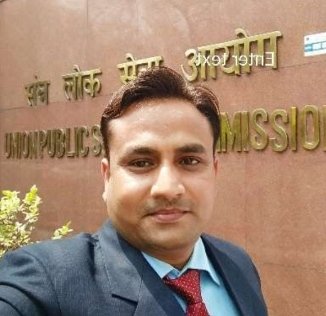 The event began with the ceremonial laying of the foundation stone for an IoT-enabled fertigation system at SKUAST by Prof. Sood.
The event began with the ceremonial laying of the foundation stone for an IoT-enabled fertigation system at SKUAST by Prof. Sood.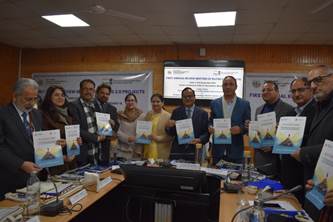
(Principal Scientific Adviser to the Government of India, Prof. Ajay Kumar Sood, chairing the First Annual Review Meeting of RuTAG 2.0 projects)
Designed to enhance the efficiency of water and fertilizer use, this innovative system aims to promote sustainable and environmentally responsible farming practices.

(Prof. Sood laying the foundation stone of IoT-based fertigation system at SKUAST)
The dignitaries also visited the Discovery Centre, where they observed research and technological advancements spearheaded by SKUAST-Kashmir. This was followed by a tour of innovative stalls demonstrating rural technologies developed by seven RuTAG centres, reflecting efforts to drive grassroots innovation and enhance rural livelihoods.
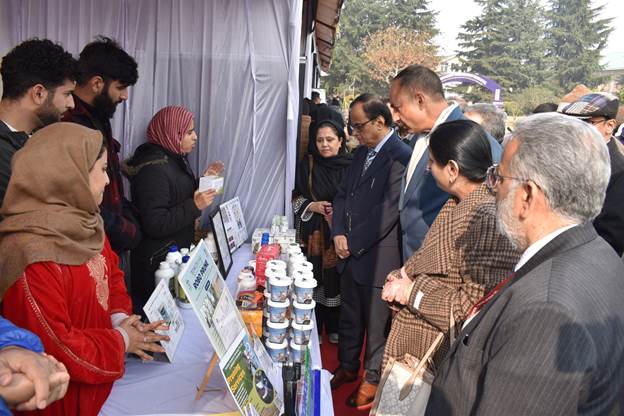
(Stalls displaying innovative rural technologies developed by RuTAG centres)
Prof. Sood also launched the official RuTAG logo, symbolizing a unified visual identity that strengthens communication and cooperation among stakeholders. In his address, Prof. Sood highlighted the transformative potential of technology in rural development, stating: “RuTAG reflects the government’s vision to empower rural communities through sustainable, high-quality innovations. By meeting global quality standards and sustainability benchmarks, we can unlock opportunities that uplift these communities and position them competitively on a global scale.”
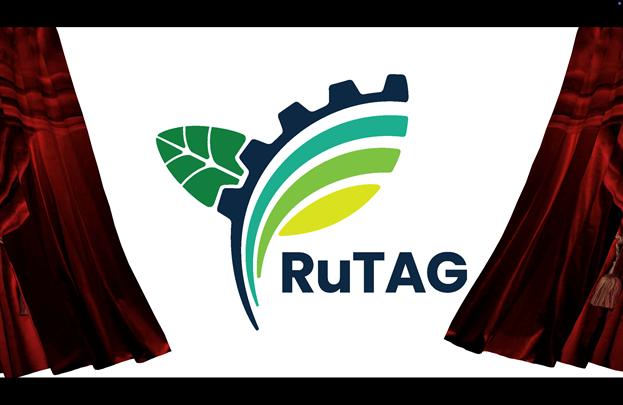
(Unveiling of the official logo of RuTAG)
During the proceedings, Dr. Parvinder Maini emphasized the need for scalable, sustainable, and commercially viable rural technologies, urging early collaboration with stakeholders to ensure greater adoption and impact, aligned with the mandate of RuTAG 2.0. She highlighted RuTAG’s role in bridging rural-urban disparities through innovative and context-specific solutions that empower local communities. She also highlighted the need to connect the S&T Clusters initiative, another flagship program of the OPSA, with the innovative technologies developed by RuTAG for probable commercialization through the clusters.
Prof. Nazir Ahmad Ganai echoed these sentiments, stating: “The university is deeply committed to advancing rural technologies through interdisciplinary collaboration, and we must scale grassroots innovations to effectively address community-specific challenges.”
Presentations on the progress of RuTAG 2.0 projects were delivered by all seven RuTAG centres, including RuTAG SKUAST-Kashmir, IIT Bombay, IIT Roorkee, IIT Guwahati, IIT Madras, IIT Delhi, and Indian Council of Agricultural Research -National Academy of Agricultural Research Management (ICAR-NAARM) Hyderabad. Prof. Ajay Kumar Sood, Dr. Parvinder Maini, and the PRMC provided feedback and recommendations to guide the future project activities of RuTAG 2.0 projects.During the meeting, the RuTAGe Smart Village Centres (RSVC) Initiative from the Office of the PSA was also introduced, highlighting a vision to transform villages into economic hubs through the deployment of innovative, affordable, and context-specific technologies tailored to local needs.This 2-day RuTAG meeting facilitated cross-collaboration for potential upscale of technologies, design improvements, use cases and further adoption of technologies in other areas of the country with similar local demands.The event concluded with a strategic discussion on the future roadmap for RuTAG 2.0. In his closing remarks, Prof. Sood stressed the importance of scaling up RuTAG technologies to achieve broader societal impact and enhance the quality of life in rural areas.The meeting convened 61 participants, including scientists, academicians, industrialists, state officials, and representatives from various RuTAG centres, marking a milestone in promoting technological innovation for rural development.
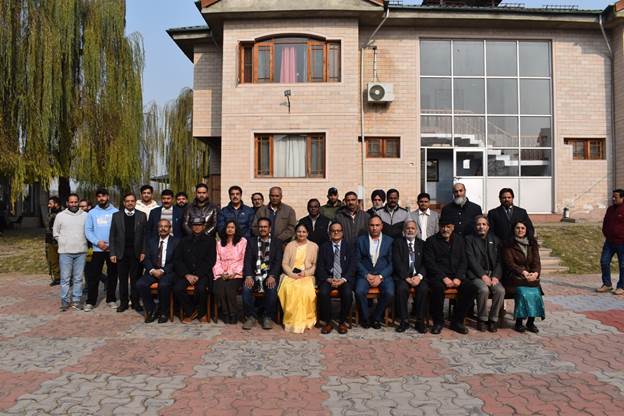
(Group photo of the participants at the meeting)
About RuTAG
Rural Technology Action Group (RuTAG) is an initiative of the Office of the PSA since 2004. RuTAG, supported by the Office of the PSA, was conceptualized as a mechanism to provide a higher level of S&T intervention and support for rural areas. Under this initiative, the interventions are designed to be primarily demand-driven, focusing on bridging technology gaps at the grassroots level, upgrading technology, and providing training and demonstrations through innovative projects.This RuTAG initiative, driven by the Office of PSA, has achieved notable success in the development and testing of rural technologies. Its extensive outreach to NGOs, SHGs, community organizations, etc., has facilitated the effective penetration of innovative solutions into rural communities, resulting in substantial benefits. The contributions of RuTAG, especially in reducing labor, enhancing production, and uplifting rural livelihoods, have been widely embraced and accepted.The Office of the PSA launched RuTAG 2.0 in April 2023, with a focus on commercialization and broader dissemination of developed technologies as products, ensuring wider accessibility and socio-economic impact. The RuTAG 2.0 initiative will emphasize translating innovation into market-ready products reflecting its commitment to driving transformative changes in rural areas and empowering communities for sustainable development.These technologies cover a wide range of sectors, including agriculture, textiles, energy, livelihood, post-harvest and food processing, water conservation, animal husbandry, aquaculture, dairy, environmental conservation, healthcare, and more.

 Please Share This News
Please Share This News 
